Postpartum Anxiety in New Fathers: A Hidden Epidemic


August 18, 2025
Understanding a Hidden Mental Health Crisis
While much attention has been given to maternal postpartum depression and anxiety, the mental health challenges faced by new fathers often remain overlooked. Recent studies reveal that paternal postpartum anxiety is a prevalent, yet underrecognized, issue that significantly impacts family wellbeing and child development. This article explores the symptoms, prevalence, risk factors, and available support systems for fathers navigating postpartum anxiety, emphasizing the importance of raising awareness and improving clinical practices to address this hidden epidemic.
Symptoms and Manifestations of Postpartum Anxiety in Fathers
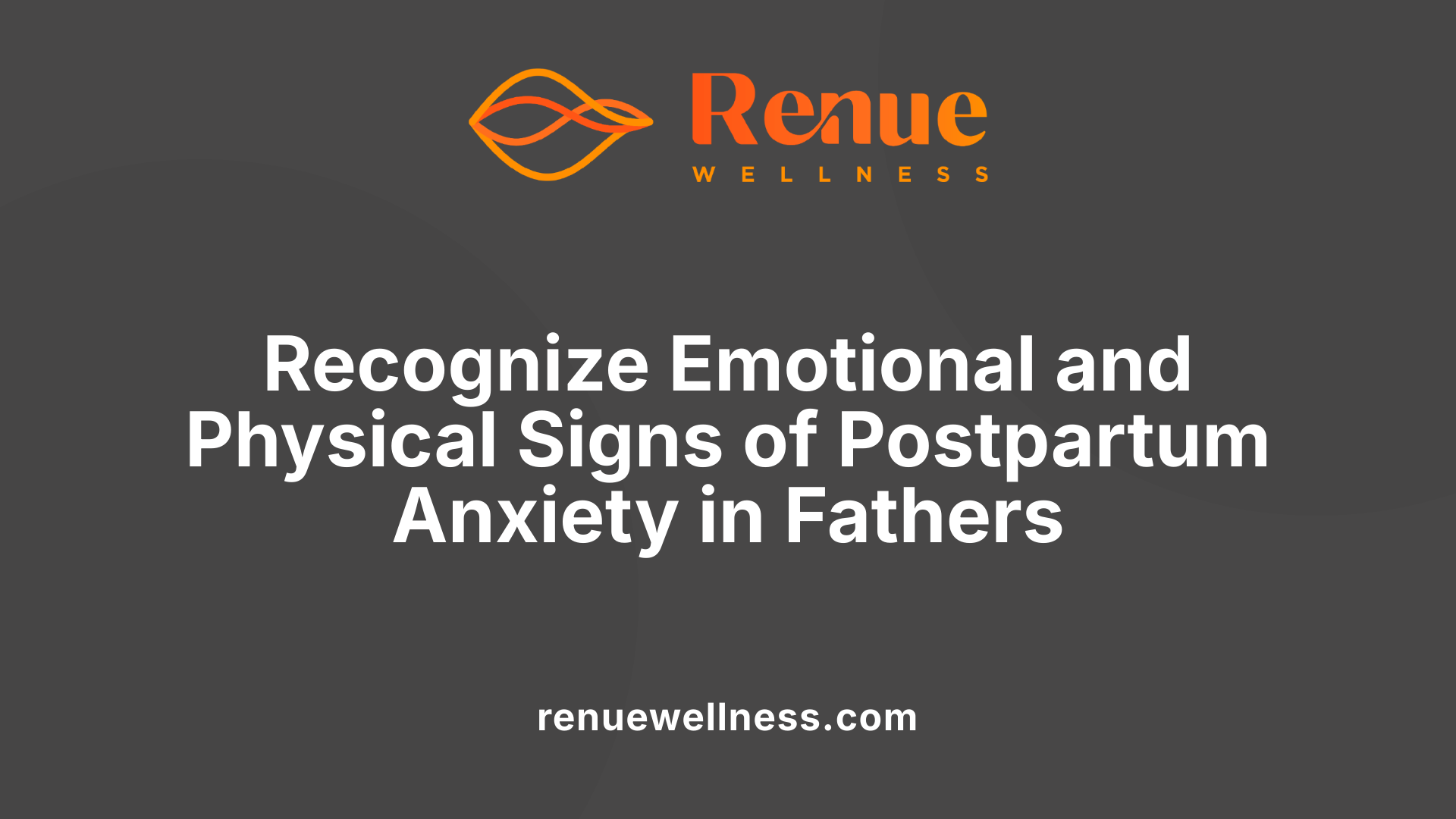
What are the symptoms of postpartum anxiety in new fathers?
Postpartum anxiety in new fathers can present a range of emotional, physical, and behavioral symptoms. Fathers may experience persistent worry and paranoia, especially related to their child's safety and health. They often report racing thoughts and intrusive fears that can feel overwhelming.
Physiologically, symptoms like rapid heartbeat, nausea, chest tightness, hot flashes, and migraines are common. These physical sensations often accompany heightened stress levels, making fathers feel 'on edge.'
Sleep disturbances are also prevalent, including insomnia and nightmares that disrupt restorative rest, further exacerbating their anxiety. Additionally, avoidance behaviors and hypervigilance—such as constantly checking on the baby or avoiding certain situations—are typical responses.
These symptoms may stem from fears about their ability to support the family, fears about their child's well-being, or worries about coping with new responsibilities. Early recognition and understanding of these signs are crucial, as they can be effectively managed through open communication, social support, and professional mental health interventions. Addressing postpartum anxiety helps fathers nurture their well-being, which in turn benefits their families.
Prevalence, Risk Factors, and Data on Postpartum Anxiety in Fathers
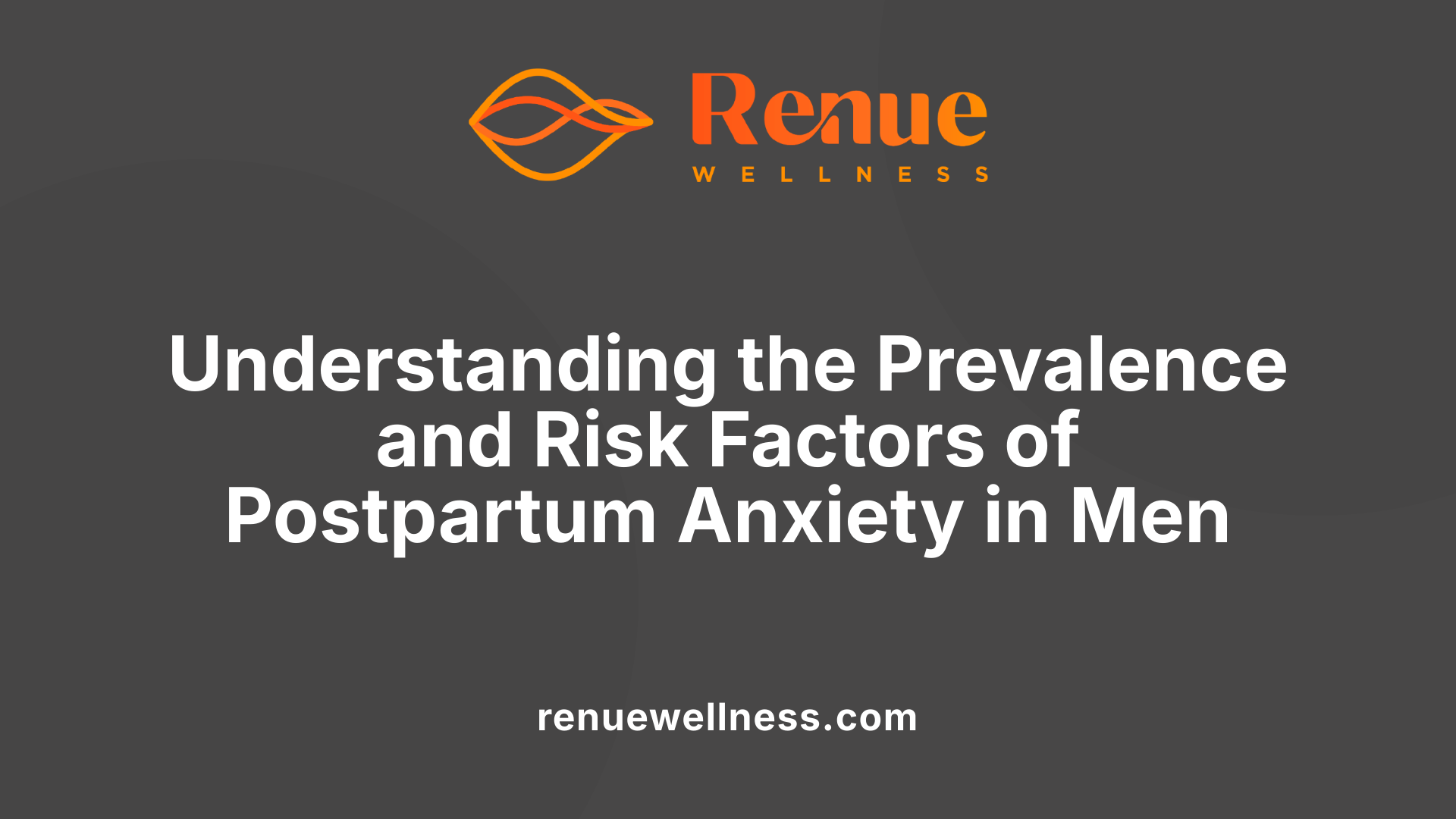 Postpartum anxiety among new fathers is a significant but often underrecognized issue. Research indicates that the rates of postpartum anxiety vary broadly, with prevalence estimates ranging from about 4% to 22.4% during the perinatal period. Studies from different regions reveal that around 8.9% of fathers experience anxiety within the first year after their child's birth, and this can increase to approximately 13.2% in the second year. In some populations, the rate has been reported as high as 18% to 22.4%, reflecting variations in study methods and cultural factors.
Postpartum anxiety among new fathers is a significant but often underrecognized issue. Research indicates that the rates of postpartum anxiety vary broadly, with prevalence estimates ranging from about 4% to 22.4% during the perinatal period. Studies from different regions reveal that around 8.9% of fathers experience anxiety within the first year after their child's birth, and this can increase to approximately 13.2% in the second year. In some populations, the rate has been reported as high as 18% to 22.4%, reflecting variations in study methods and cultural factors.
Several risk factors contribute to the development of postpartum anxiety in fathers. Men with a history of mental health issues such as depression or anxiety prior to pregnancy are at higher risk. Experiencing sleep deprivation, relationship dissatisfaction, and financial stress also play crucial roles in increasing vulnerability. Adverse childhood experiences and instances of intimate partner violence further elevate the likelihood of postpartum anxiety.
Global events, particularly the COVID-19 pandemic, have worsened the mental health landscape for new fathers. The pandemic's economic hardships, health worries, and social isolation caused a notable rise in anxiety levels, as seen in various studies worldwide.
Research from diverse populations enhances our understanding of this issue. For example, in Saudi Arabia, a recent study found that approximately 16.6% of fathers exhibited postpartum depression, which is often accompanied by anxiety symptoms. In North America, data reveal that about 10% to 15% of fathers report high anxiety levels during the perinatal phase.
Addressing these challenges requires early screening and intervention. Healthcare providers should consider factors such as prior mental health history, family dynamics, and external stressors. By focusing on modifiable risk factors—like sleep quality, social support, and relationship health—early detection and comprehensive support can significantly reduce the burden of postpartum anxiety, leading to healthier family environments.
Differentiating Postpartum Anxiety from Postpartum Depression in Men
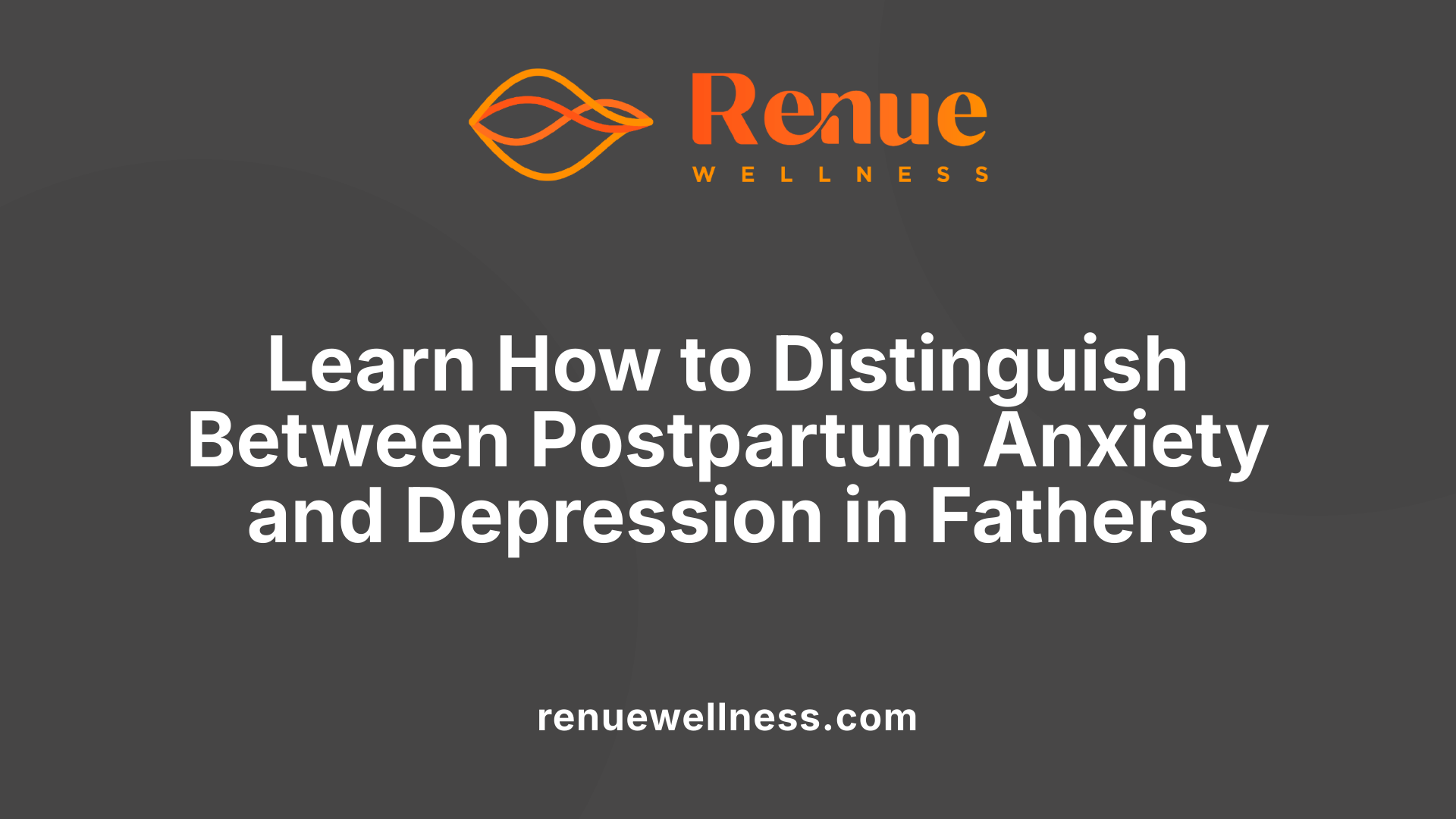
What is the difference between postpartum anxiety and postpartum depression in men?
Postpartum anxiety and postpartum depression (PPD) in men are two related but distinct mental health conditions that can occur after the birth of a child. Recognizing their differences is crucial for effective support and treatment.
Postpartum depression in men usually manifests with symptoms such as irritability, emotional withdrawal, feelings of worthlessness, low motivation, and persistent sadness. Physical symptoms like headaches, stomach issues, or fatigue may also be present. Men with PPD often experience a loss of interest in activities, difficulties bonding with their baby, and feelings of hopelessness.
In contrast, postpartum anxiety is characterized primarily by excessive worry, nervousness, and physical signs like rapid heartbeat or panic attacks. Men suffering from postpartum anxiety may display obsessive thoughts about their child's safety or health, leading to restless behaviors and difficulty concentrating.
While both conditions can overlap—such as sleep disturbances, irritability, and mood changes—the key difference lies in their core features: sadness and emotional blunting in depression, versus worry and physical agitation in anxiety.
Understanding these differences helps healthcare providers tailor appropriate treatments. For PPD, approaches like psychotherapy, support groups, and sometimes medication targeting depression may be effective. For postpartum anxiety, cognitive-behavioral therapy (CBT) and mindfulness strategies are often recommended, focusing on managing worry and physical symptoms.
In summary, accurate differentiation between postpartum anxiety and depression ensures that fathers receive targeted pathways to recovery, reducing long-term impacts on their well-being and their ability to support their family.
Impacts of Postpartum Anxiety on Fathers and Family Dynamics
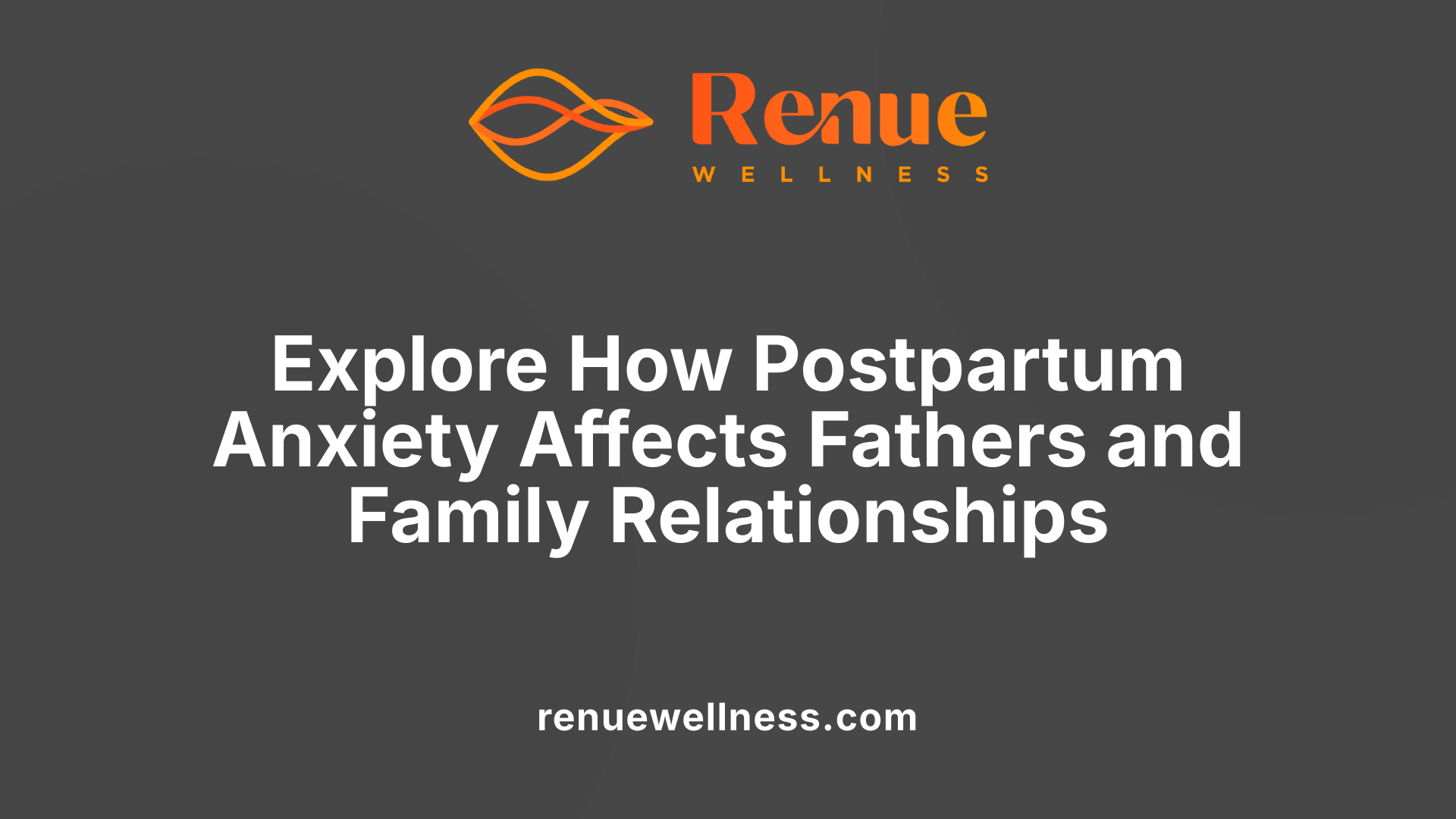 Postpartum anxiety in fathers is a prevalent concern, affecting roughly 10% of new dads during the perinatal period. Although often less visible than maternal postpartum depression, paternal anxiety can profoundly influence family well-being. Fathers experiencing postpartum anxiety may struggle with increased stress and irritability, which can reduce their emotional availability and hinder bonding with their newborn. This emotional withdrawal may also cause strains in partner relationships, leading to misunderstandings, conflicts, or diminished intimacy.
Postpartum anxiety in fathers is a prevalent concern, affecting roughly 10% of new dads during the perinatal period. Although often less visible than maternal postpartum depression, paternal anxiety can profoundly influence family well-being. Fathers experiencing postpartum anxiety may struggle with increased stress and irritability, which can reduce their emotional availability and hinder bonding with their newborn. This emotional withdrawal may also cause strains in partner relationships, leading to misunderstandings, conflicts, or diminished intimacy.
The consequences extend beyond the couple, potentially impacting the child's development. Research shows that children of fathers with postpartum anxiety or depression are at higher risk for behavioral issues, emotional regulation difficulties, and developmental delays. These conditions can interfere with the child's social engagement and cognitive progress.
Furthermore, parental mental health problems tend to have a ripple effect within the family. When fathers are overwhelmed by anxiety, the overall family stability and cohesion can be compromised. This may result in decreased family support, increased tension, and challenges in managing daily routines.
Addressing postpartum anxiety early through routine screening and providing targeted support is crucial. Interventions such as counseling, peer support groups, and psychoeducation can help fathers manage their anxiety. Enhancing communication within the family, promoting involvement in parenting, and ensuring access to mental health resources contribute to healthier family environments. Strengthening fathers’ mental health not only benefits individual well-being but also fosters positive relational dynamics and promotes optimal development for children.
Support Systems, Resources, and Interventions for Fathers
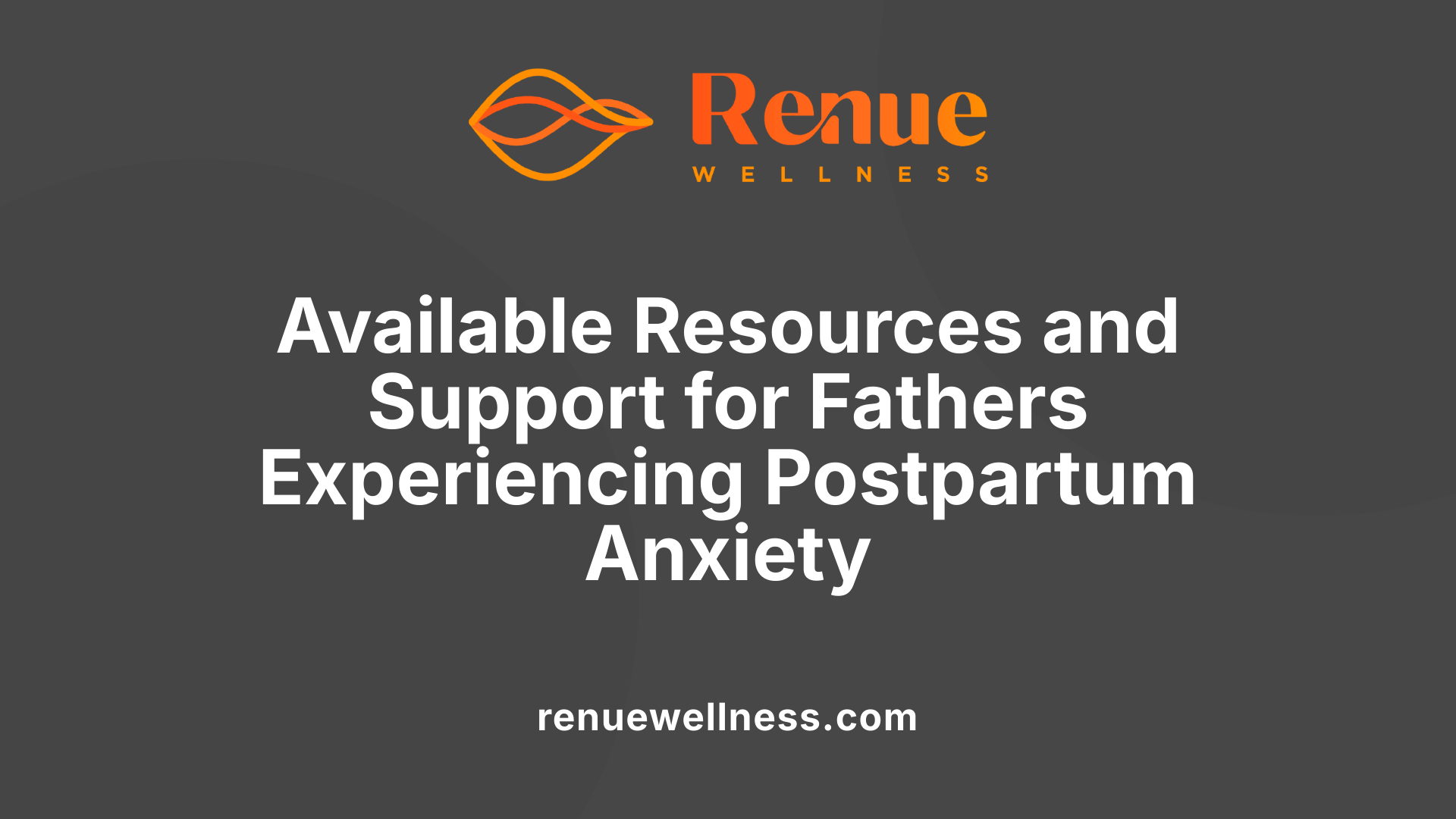
What resources and interventions are available to support new fathers experiencing postpartum anxiety?
Support for fathers facing postpartum anxiety is expanding as awareness of paternal mental health grows. Several resources and strategies are designed to help fathers cope with the emotional challenges during the postpartum period.
One of the primary avenues is counseling and therapy. Mental health professionals can provide individual psychotherapy, such as cognitive-behavioral therapy (CBT), which is effective in managing anxiety. Pharmacological options, like SSRIs, are also available when clinically indicated, often in combination with therapy.
Support groups play a crucial role. Organizations such as Postpartum Support International (PSI) offer specialized groups for fathers. The PSI helpline (1-800-944-4773) provides immediate guidance and emotional support. Online communities and peer mentorship programs, like Dad's groups—such as 'Daddy Blues' or 'The Postpartum Husband'—connect new fathers with others who have navigated similar experiences. These platforms foster sharing, reducing feelings of isolation.
Educational initiatives and workshops are valuable for equipping fathers with practical coping skills. Programs like 'Daddy Boot Camp' or local parenting classes focus on building confidence, understanding postpartum emotions, and improving communication within families.
Healthcare providers also play a pivotal role. During well-child visits or postpartum check-ups, clinicians can screen fathers using tools like the Edinburgh Postnatal Depression Scale (EPDS) adapted for fathers. They can then refer fathers to mental health specialists or recommend appropriate treatment options.
Reducing stigma around paternal postpartum mental health is essential. Normalizing these experiences encourages fathers to seek help without shame. Overall, combining professional support, peer networks, educational resources, and proactive screening creates a comprehensive safety net for fathers experiencing postpartum anxiety.
By addressing mental health openly and providing accessible interventions, families can foster healthier relationships and promote better outcomes for both fathers and their children.
The Importance of Raising Awareness and Societal Implications
Understanding paternal postpartum anxiety is vital for society and healthcare systems alike. Since around 10% to 25% of new fathers experience depression during the perinatal period, early identification and intervention can help prevent long-term issues within families.
Raising awareness reduces the stigma associated with mental health struggles in fathers, encouraging them to seek help without feeling ashamed. When fathers feel supported, they are more likely to engage in caregiving and bonding, which benefits both the child's development and the overall family well-being.
Including fathers in perinatal mental health initiatives is essential. Healthcare providers should routinely screen for conditions like postpartum depression and anxiety using validated tools such as the Edinburgh Postnatal Depression Scale (EPDS). These screenings, coupled with tailored support, enable early detection and treatment.
Policy changes at the governmental and institutional levels can foster a more inclusive approach. This might include providing parental leave for fathers, offering mental health resources specifically aimed at men, and integrating paternal mental health into standard perinatal care.
Supporting healthy paternal mental health yields broader societal benefits. It promotes stronger family relationships, reduces the risk of behavioral problems in children, and lessens the long-term economic costs associated with untreated mental health conditions.
Proactive strategies such as education campaigns, community support groups, and accessible mental health services are key. Early detection allows for timely treatment through psychotherapy, medication, or social support, ensuring fathers can navigate the transition into parenthood more effectively.
Incorporating these measures helps create a society where mental health issues in fathers are normalized and addressed openly. Such initiatives foster resilient families, improve child outcomes, and support public health objectives by promoting mental well-being across generations.
Research Findings and Data Supporting the Recognition of Postpartum Anxiety in Fathers
What research findings exist regarding postpartum anxiety in fathers?
Research shows that approximately 11% of new fathers experience anxiety during the perinatal period, with overall prevalence rates around 14.3%. Postpartum anxiety in men manifests through symptoms like excessive worry about their child's health, panic attacks, intrusive thoughts, sleep disturbances, and physical complaints such as gastrointestinal issues or racing heart.
Studies reveal that paternal anxiety often co-occurs with postpartum depression, impacting not only the father's mental health but also the child's development and family dynamics. For example, high levels of anxiety are linked to less attentive involvement in health visits, poorer emotional responses, and increased behavioral issues in children.
Despite its significant prevalence, postpartum anxiety in fathers remains under-recognized and rarely diagnosed. This gap is partly due to the lack of routine screening practices, as well as the absence of postpartum anxiety as a distinct category in many diagnostic manuals like the DSM. Contributing factors include previous mental health history, sleep deprivation, stress from preterm birth or infant health problems, and attachment insecurities.
Hormonal shifts, such as decreased testosterone levels, also play a role in the development of anxiety symptoms among new fathers. A decline in testosterone, combined with hormonal increases in prolactin and cortisol, may influence mood and bonding, further elevating the risk of anxiety.
The ongoing pandemic has worsened this situation, with global stress, economic strain, and health concerns increasing paternal postpartum anxiety by about 5%. Despite these findings, screening for postpartum mental health issues in men is not yet standard, highlighting a need for targeted support, early detection, and intervention efforts.
In sum, the substantial data on paternal postpartum anxiety underscores its importance as a critical component of perinatal mental health. Greater awareness and routine screening can help identify at-risk fathers early, allowing for timely support and improved outcomes for entire families.
| Aspect | Data | Additional Notes |
|---|---|---|
| Prevalence rate | ~11% experiencing anxiety; 14.3% general prevalence in fathers | Varies in different populations, with estimates reaching up to 25% in some studies |
| Symptoms | Excessive worry, panic attacks, sleep disturbance, physical complaints | Often overlaps with depression, complicating diagnosis |
| Risk factors | Past mental health issues, sleep deprivation, infant health stress, attachment insecurity | Hormonal changes like decreased testosterone also contribute |
| Impact | Affects father’s support, child’s development, family relationships | Underdiagnosed, with screening practices lacking |
Recognizing and Addressing Postpartum Anxiety in Healthcare Practice
How can healthcare professionals better recognize postpartum anxiety symptoms in new fathers?
Healthcare providers play a crucial role in identifying postpartum anxiety early. Recognizing symptoms in fathers involves paying close attention to both emotional and physical signs. Fathers experiencing postpartum anxiety may present with persistent worry, racing thoughts, irritability, difficulty sleeping, or physical sensations like chest tightness, nausea, or gastrointestinal discomfort.
Routine screening using validated tools adapted for fathers can significantly improve diagnosis. The Edinburgh Postnatal Depression Scale (EPDS), for example, has been validated for screening paternal depression and anxiety when appropriately modified. Additionally, the CES-D and BDI are useful alternative screening instruments.
Training healthcare professionals to understand risk factors—such as prior mental health issues, sleep deprivation, relationship difficulties, recent stressful life events, or a history of anxiety—can aid in early detection. Recognizing that postpartum anxiety often coexists with depression and is often overlooked in routine assessments is vital.
Creating an environment where fathers feel safe to discuss their feelings is essential. Healthcare providers should normalize mental health conversations, emphasizing that anxiety is common, treatable, and not a sign of personal weaknes**s. This approach helps reduce stigma and encourages fathers to disclose symptoms.
During postpartum visits, providers should actively inquire about mental health, emotional well-being, and support systems. Open-ended questions that invite discussion about worries, feelings of connection with the baby, and relationship dynamics can uncover issues that might otherwise go unnoticed.
When symptoms are identified, timely referral to mental health specialists, such as psychologists or psychiatrists, ensures fathers receive appropriate therapies, which may include counseling, medication, or support groups. Overall, a proactive and informed approach enhances early recognition and improves outcomes for fathers and their families.
Towards Better Mental Health Support for Fathers
Addressing postpartum anxiety in new fathers requires a multifaceted approach—raising awareness among healthcare providers, promoting open conversations, ensuring routine screening, and providing accessible resources. Recognizing that paternal mental health significantly influences family dynamics and child development underscores the importance of inclusive perinatal care. By integrating mental health support into standard postnatal services and fostering societal acceptance, we can mitigate the hidden epidemic of postpartum anxiety in fathers, leading to healthier families and more resilient communities.
References
- Exploring the influence of paternal perinatal depression on father ...
- 1 in 10 dads experience postpartum depression, anxiety
- Resources for Fathers - Maternal Mental Health Leadership Alliance
- The Unrelenting Agony of Being a Depressed New Dad - Men's Health
- Impact of Paternal Postpartum Depression on Maternal and Infant ...
- The Science Behind Postpartum Depression in Dads - Happiest Baby
- Books to Support Parents and Partners on the Postpartum Journey
- Postpartum Depression and Anxiety… in Fathers? - Psychology Today
- Postpartum Anxiety Is an Epidemic Among American Mothers | TIME
- Paternal Postnatal Depression Among Fathers of Newborn in Saudi ...
Recent Posts
Conditions Treated
AnxietyDepressionOCDPTSDPostpartum DepressionPain ManagementSubstance AbuseSuicidal IdeationOur Location


